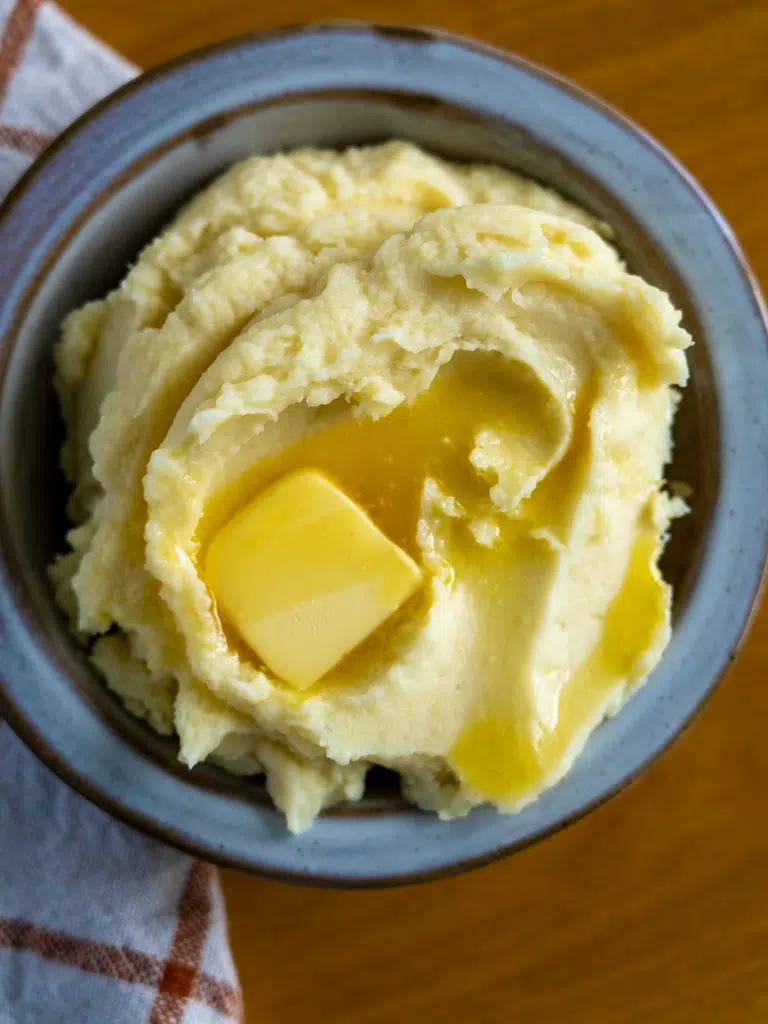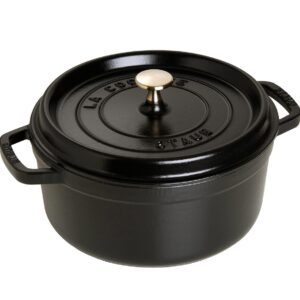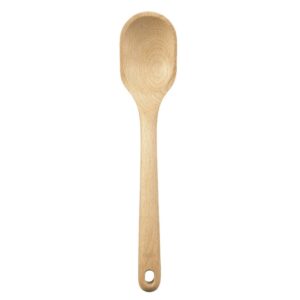Ingredients
- 2 kg (4 lb 6 oz) all-rounder potatoes (see note 1), unpeeled
- 4 tsp salt
- 1 cup (250 ml) full-cream (whole) milk, warmed (see note 2)
- 120 g (4½ oz) butter
Instructions
- Boil the potatoes – Place the unpeeled potatoes in a large pot, add 3 teaspoons of the salt and add water to cover the potatoes by at least 8 cm (3¼ inches).
- Bring the water to the boil, then reduce the heat to a rapid simmer and cook the potatoes for 15–20 minutes or until a fork can pierce the centre easily.
- Drain and remove the skins – Drain the potatoes and, once they have slightly cooled, peel off the skin. It will come off easily (you can use a butter knife and I use a clean tea/dish towel to hold the potatoes if they are too hot to handle).
- Mash – Place the potatoes back into the warm pan and mash them using a fine potato masher (one with small holes) OR pass the potatoes through a ricer (see note 3).
- Add milk, salt and butter – Add the milk, remaining 1 teaspoon of salt and the butter to the potatoes. Use a spatula to combine.
- Store – Store the mashed potatoes in airtight, freezer-safe containers. I find a container holding 500 g (1 lb 2 oz) is perfect for one family dinner serving (and this recipe makes approximately three of these containers, depending on the size of your potatoes).
- Refrigerate for up to 3 days or freeze for up to 3 months.
- Reheating instructions from refrigerated – Microwave the mashed potatoes on High for 2 minutes, lid ajar. Stir well and microwave for a further 2 minutes, lid ajar. Allow to stand for 1 minute before serving. For extra creaminess, stir through an additional ¼ cup (60 ml) of milk or ¼ cup (60 ml) of thickened (heavy) cream.
- Reheating instructions from frozen – Microwave the mashed potatoes on High for 4 minutes, lid ajar. Stir well and microwave for a further 4 minutes, lid ajar. Allow to stand for 1 minute before serving. For extra creaminess, stir through an additional ¼ cup (60 ml) of milk or ¼ cup (60 ml) of thickened (heavy) cream.
Notes
Note 1 – Which potatoes are best for mashed potatoes? Not all potatoes are made equal. An all-rounder, floury potato high in starch will produce the fluffiest, creamiest mash. Opt for desiree, Dutch cream or sebago in Australia, Yukon gold or russet in the US, or Maris Piper in the UK. It is not a complete deal breaker if you don’t use one of these varieties, but these will produce the best results. Regardless of your potato of choice, opt for small to medium potatoes as these will cook most consistently and allow you to peel the potatoes after cooking (larger potatoes would need to be peeled and quartered prior to cooking).
Note 2 – Why is warm milk best for mashed potatoes? It’s much easier to incorporate the milk into the potatoes if it’s a similar temperature and it results in a smoother mashed potato. Place the milk in a microwave-safe mug and microwave it on High in 30-second intervals or warm it on the stovetop.
Note 3 – Ever wondered how restaurants get their mashed potatoes so smooth and creamy? They pass their mashed potatoes through a drum sieve (which can be time-consuming and fussy). You can get equally amazing results by using a fine potato masher (small holes = finer, smoother mashed potatoes) or, even better, a potato ricer, which I find to be the quickest and easiest method (you can even add the cooked unpeeled potatoes directly into the ricer if you don’t mind fragments of potato skin in your mashed potatoes). My preference is to NOT use a blender or food processor as this can result in too much starch being released and gluey/sticky potatoes.
MAKE AHEAD
Prepare your mashed potatoes ahead of time, ready for when you need them. Refrigerate for up to 3 days and freeze for up to 3 months in an airtight container. Check out the full recipe for reheating instructions (you can reheat your mashed potatoes from frozen)! Reheat refrigerated mashed potatoes for 4 minutes and frozen mashed potatoes for 8 minutes or until piping hot. See the full recipe for exact details, or see below for instructions to reheat on the stovetop or in the oven.
LEFTOVERS
Refrigerate or freeze mashed potato leftovers as per the recipe and use them in another dish. Try my delicious, family-friendly Cottage Pie. Reheat refrigerated mashed potatoes for 4 minutes and frozen mashed potatoes for 8 minutes or until piping hot.
- Reheating on the stovetop – Place the frozen mashed potatoes in a covered saucepan over low heat. To remove the mashed potatoes from the container, you may need to run it under hot running tap water for a 1 minute to loosen the edges and allow it to pop out easily. Add a splash of milk and stir frequently as the mash slowly thaws and heats through. This can take around 15–20 minutes, depending on the amount. Stir well to restore creaminess, adding more milk or butter if needed.
- Reheating in the oven – Preheat the oven to 200°C (400°F) (180°C/350°F fan-forced). Transfer the frozen mashed potatoes to an ovenproof dish, cover tightly with foil, then bake for 30–40 minutes, stirring once or twice during cooking. Add a little milk or butter if needed before serving.
- Prep Time: 15 mins
- Cook Time: 20 mins



